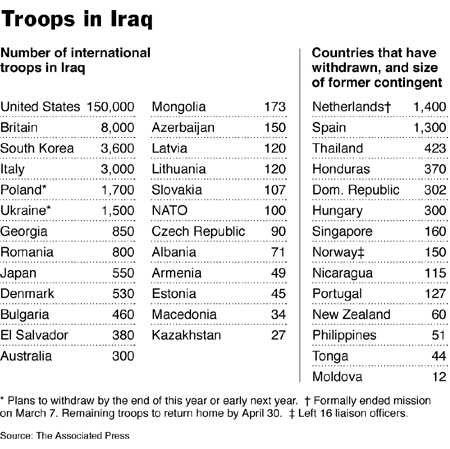Berlusconi's decision makes sense. The US troops wounding Giuliana Sgrena, an Italian journalist who was just freed from Iraqi insurgents, and killing Nicola Calipari, an Italian agent escorting her to safety, certainly highlighted high costs of Italian subservience to Washington, outraging the Italian public. More importantly, a huge majority of Italians want to withdraw the troops from Iraq.
Polling DataNot surprisingly, Italian voters looked like they were ready to boot out Berlusconi and bring the Unione, the center-left coalition opposed to the Iraq War, into power:
What should Italy do about the Iraq war?
Mar. 2005
Feb. 2005
Withdraw all troops from Iraq now
47.0%
35.1%
Remain in Iraq, only if the mission
falls under UN or EU mandate30.6%
41.1%
Remain in Iraq as part of the
United States-led coalition8.5%
9.6%
Source: Eurisko / La Repubblica
(Angus Reid Consultants - CPOD Global Scan, "Italians Support Iraq Troop Withdrawal," March 16, 2005)
Methodology: Telephone interviews to 1,504 Italian adults, conducted from Mar. 7 to Mar. 10, 2005. No margin of error was provided.
The Unione (Union) of centre-left opposition parties is leading in the early stages of Italy’s electoral race, according to a poll by Istituto Piepoli published in La Stampa. 48 per cent of respondents would vote for the alliance.The Spanish scenario (the anti-war Socialist Party trounced the pro-war Popular Party in Spain in March 2004) in the next Italian parliamentary election had already been foreshadowed by the local and European Union elections in Italy -- the pattern also seen in the local and EU elections in the Netherlands, Spain, and the United Kingdom:
Former president of the European Commission Romano Prodi is expected to lead Unione —- which includes the Olive Tree United List (Ulivo) and the Communist Refoundation Party (PRC) —- into the next parliamentary election, tentatively scheduled for May 2006.
The governing coalition of centre-right parties [House of Freedom (Casa)] —- which includes prime minister Silvio Berlusconi’s Forwards Italy (Forza Italia) —- garners the backing of 46 per cent of respondents. . . .Polling Data
If the election took place this Sunday, what party would you support?
Feb. 2005
Dec. 2004
Union (Unione)
48%
47%
Olive Tree United List (Ulivo)
34.5%
33.5%
Popular Alliance (UDEUR)
1%
1%
Party of Italian Communists (PCI)
2.5%
2.5%
Green / Sunflower (Verdi / Girasole)
2%
2%
Italy of Values (Lista di Pietro / Occhetti)
1.5%
1.5%
Communist Refoundation Party (PRC)
6.5%
6.5%
House of Freedom (Casa)
46%
47.5%
Forwards Italy (Forza Italia)
20.5%
22%
National Alliance (AN)
13%
12.5%
Union of Christian and Centre-Democrats (UDC)
5.5%
5.5%
Northern League (LN)
4.5%
5%
New Italian Socialist Party (Nuovo PSI)
2%
2%
Republicans (R)
0.5%
0.5%
Marco Panella / Emma Bonino List
2%
2%
Social Alternative (AS)
1%
1%
Other
3%
2.5%
Source: Istituto Piepoli / La Stampa
(Angus Reid Consultants - CPOD Global Scan, "Italy’s Centre-Left Up By Two Per Cent," March 10, 2005)
Methodology: Telephone interviews to 500 Italian adults, conducted on Feb. 28, 2005. No margin of error was provided.
Prime Minister Berlusconi's Forza Italia Party suffered a string of defeats in the local elections as well as a major setback in the EU poll, where its support dropped to about 22.5%. In the last general election, Forza Italia took 29.4% of the vote and 25.2% in the previous European Parliament election. Berlusconi had repeatedly told Italians that his party would capture at least 25% of the vote. The poll was widely seen as a crucial test of the premier's popularity.Will the Italian troop withdrawal change the electoral outcome?
Berlusconi has faced strong opposition for supporting the war in Iraq and dispatching 3,000 troops to the country. (J. Sean Curtin, "Iraq a Vote Loser for Bush's European Allies," Asia Times/Worldpress.org, June 16, 2004)





No comments:
Post a Comment